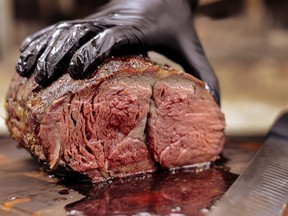
Reviews and recommendations are unbiased and products are independently selected. Postmedia may earn an affiliate commission from purchases made through links on this page.
Article content
Guess it’s not baloney after all.
Advertisement 2
Article content
A study out of England has backed up research from Harvard University showing that eating too much red meat and processed meat can increase the risk of developing Type 2 diabetes, the New York Post reported.
Researchers at Cambridge University compiled data from 31 different studies across 20 countries — including 18 unpublished studies — and factored in the age, gender, health-related behaviour, energy intake and body mass of almost two million participants.
They found that eating 50 grams per day of processed meat — about two slices of ham, according to the Post — was linked to a 15% higher risk of developing Type 2 diabetes within a 10-year span.
Eating 100 g of unprocessed red meat — about the equivalent of a quarter-pound burger — was linked to a 10% higher risk, while the same amount of chicken was linked to an 8% higher risk that “remains uncertain and needs to be investigated further,” according to researchers.
Article content
Advertisement 3
Article content
“Our research provides the most comprehensive evidence to date of an association between eating processed meat and unprocessed red meat and a higher future risk of Type 2 diabetes,” senior study author Nita Forouhi said, via the Post.
“It supports recommendations to limit the consumption of processed meat and unprocessed red meat to reduce Type 2 diabetes cases.”
The study supported recent findings by Harvard University researchers, who found a “significant link” between Type 2 diabetes risk and the heme iron found in red meat and other animal products.
The Harvard study also said that heme iron may also cause inflammation, while some research suggests it may increase the risk of colorectal, pancreatic and lung cancer, according to the Post.
Advertisement 4
Article content
Experts say there are “pros and cons” of eating red meat, which is high in protein, vitamin B12 and selenium but also rich in saturated fat.
“Depending on the processing, (red meat) can be high in sodium and preservatives,” Dr. Ruchi Mathur, an endocrinologist at Cedars-Sinai in Los Angeles, told the New York Times last year. “None of these are good for our health.”
The Cambridge researchers warned that there were limitations to their study, including inaccurate reporting by participants on what they ate and other variables. However, they said the study “provides more concrete evidence of the link between consumption of different types of meat and Type 2 diabetes than was previously possible.”
Nearly six million Canadians were living with diabetes in 2022, according to the Diabetes Canada. Health Canada said that about 90% of people diagnosed with the disease have Type 2 diabetes, which means the body can still make insulin but can’t process it properly.
Article content
